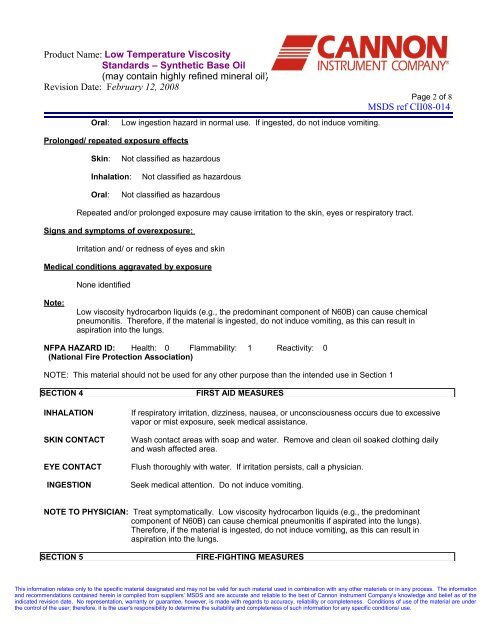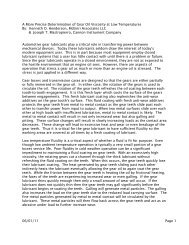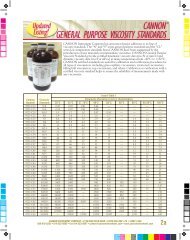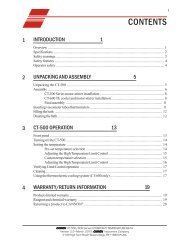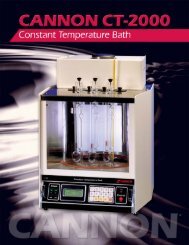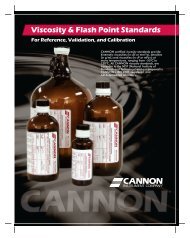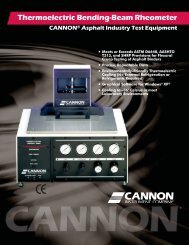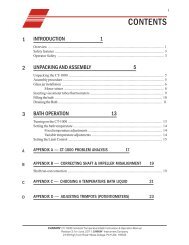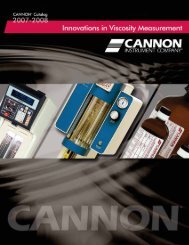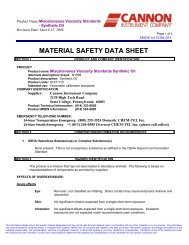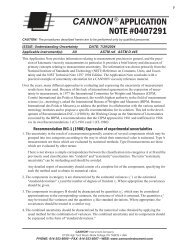MATERIAL SAFETY DATA SHEET - Cannon Instrument Company
MATERIAL SAFETY DATA SHEET - Cannon Instrument Company
MATERIAL SAFETY DATA SHEET - Cannon Instrument Company
You also want an ePaper? Increase the reach of your titles
YUMPU automatically turns print PDFs into web optimized ePapers that Google loves.
Product Name: Low Temperature Viscosity<br />
Standards – Synthetic Base Oil<br />
(may contain highly refined mineral oil)<br />
Revision Date: February 12, 2008<br />
Oral:<br />
Prolonged/ repeated exposure effects<br />
Low ingestion hazard in normal use. If ingested, do not induce vomiting.<br />
Page 2 of 8<br />
MSDS ref CII08-014<br />
Skin:<br />
Not classified as hazardous<br />
Inhalation:<br />
Not classified as hazardous<br />
Oral:<br />
Not classified as hazardous<br />
Repeated and/or prolonged exposure may cause irritation to the skin, eyes or respiratory tract.<br />
Signs and symptoms of overexposure:<br />
Irritation and/ or redness of eyes and skin<br />
Medical conditions aggravated by exposure<br />
None identified<br />
Note:<br />
Low viscosity hydrocarbon liquids (e.g., the predominant component of N60B) can cause chemical<br />
pneumonitis. Therefore, if the material is ingested, do not induce vomiting, as this can result in<br />
aspiration into the lungs.<br />
NFPA HAZARD ID: Health: 0 Flammability: 1 Reactivity: 0<br />
(National Fire Protection Association)<br />
NOTE: This material should not be used for any other purpose than the intended use in Section 1<br />
SECTION 4<br />
INHALATION<br />
SKIN CONTACT<br />
EYE CONTACT<br />
INGESTION<br />
FIRST AID MEASURES<br />
If respiratory irritation, dizziness, nausea, or unconsciousness occurs due to excessive<br />
vapor or mist exposure, seek medical assistance.<br />
Wash contact areas with soap and water. Remove and clean oil soaked clothing daily<br />
and wash affected area.<br />
Flush thoroughly with water. If irritation persists, call a physician.<br />
Seek medical attention. Do not induce vomiting.<br />
NOTE TO PHYSICIAN: Treat symptomatically. Low viscosity hydrocarbon liquids (e.g., the predominant<br />
component of N60B) can cause chemical pneumonitis if aspirated into the lungs).<br />
Therefore, if the material is ingested, do not induce vomiting, as this can result in<br />
aspiration into the lungs.<br />
SECTION 5<br />
FIRE-FIGHTING MEASURES<br />
This information relates only to the specific material designated and may not be valid for such material used in combination with any other materials or in any process. The information<br />
and recommendations contained herein is compiled from suppliers’ MSDS and are accurate and reliable to the best of <strong>Cannon</strong> <strong>Instrument</strong> <strong>Company</strong>’s knowledge and belief as of the<br />
indicated revision date. No representation, warranty or guarantee, however, is made with regards to accuracy, reliability or completeness. Conditions of use of the material are under<br />
the control of the user; therefore, it is the user's responsibility to determine the suitability and completeness of such information for any specific conditions/ use.


